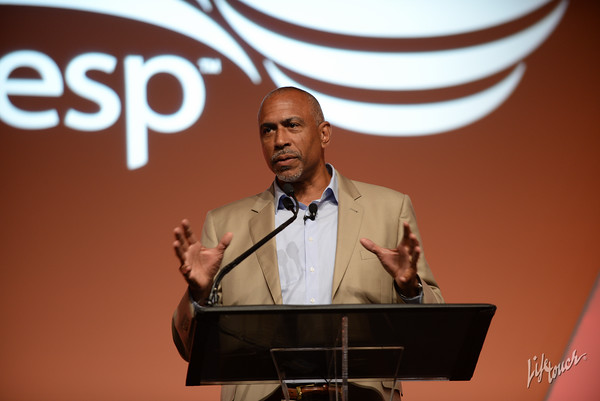Achieving Excellence and Equity
NAESP conference keynoter Pedro Noguera, who urged principals to find balance in constantly changing environments, asked if we if are expanding opportunities or if we are reproducing inequalities.
By Liz Garden
Communicator
July 2016, Volume 39, Issue 11

As I found my seat for the closing session at the NAESP annual conference, my mind was spinning with all of the new knowledge I had gained and connections I had made over the past few days. I wasn’t sure that I could take any more in. Then Pedro Noguera began to speak, and I could not type fast enough—I was trying to capture every inspirational word that was coming out of his mouth.

Session: Challenging Racial Inequality in Our Schools
Speaker: Pedro Noguera, urban sociologist
Key Takeaway: “The more you know about who you serve, the more you know about how to serve them.”
Noguera discussed the importance of striking a balance between technical and adaptive work. This is that battle that we all face as principals: We can no longer solely be the managers of buildings. There are still procedures that have to be put in place and policies that we need to oversee. But we have to make sure that we place most of our energy on adaptive work, achieving goals in an ever-changing environment. “Instructional leadership is always adaptive work,” said Noguera. In order to achieve excellence and equity, we must be instructional leaders, visionary leaders who are setting a course and guiding our schools’ ships through a constantly changing environment.
There were many heads nodding in agreement as Noguera explained the challenges that principals are faced with today. Charged with achieving excellence and equity, we must figure out how to:
- Close the achievement gap between poor and affluent students;
- Turn around underperforming schools;
- Make progress despite unpredictable financing and unhelpful educational policies; and
- Handle the pressure of a frustrated public.
In the meantime, we are trying to make connections, build relationships and provide instructional leadership.
Expanding Opportunities
So how do we tackle this long list of expectations and challenges? Noguera would say that the “best schools are greater than the sum of their parts; they are united by a common vision.” I had many favorite lines that I wrote down from his speech, but one of my all time favorites was when he told us to, “Think of your schools as a garden. What gardener would blame the tomatoes?” We have to think about what we can do better to help all of our tomatoes—our students—grow.
We need to be asking ourselves if we are expanding opportunities, or if we are reproducing equity inequalities? For example, Noguera reminded us that music is never on a standardized test, and neither is recess. But should we take away the arts or take away physical activity from our children? Absolutely not, he believes. He argued that we have to stop focusing on just test scores. With the onset of an intense focus on assessment and standardized testing across the country, there has been a push to make sure we are providing a rigorous curriculum for all learners.
Noguera reminded us all, “rigor is not just a lot of work, rigor is about being made to think hard.” We need to make sure we aren’t just adding more and more work to our students’ (and teachers’) plates; we simply need to make sure that we are connecting with them and getting them to think.
While reflecting with another principal a week after the NAESP conference, we discussed another great quote that I am sure resonated with many in the audience and got to the heart of Noguera’s message: “The more you know about who you serve, the more you know about how to serve them.” It is a simple statement—but it is so powerful and so important for us all to remember.
As adaptive leaders, we must know our students; we must build those relationships so that we know how to reach them. Each student is different, but if we know who they truly are—I don’t mean what their test score is, I mean really know who we are serving—then we can make a plan of action that allows all students to be successful. And the same goes for our teachers and staff. We have to resist the trend of disinvestment and distance among educators and public education. We need to make connections with each other. As leaders, we need to know our staff, build their capacity, appreciate their dedication, and celebrate their successes.
As servent-leader Robert K. Greenleaf said, “Revolutionary ideas do not change institutions. People change them by taking the risks to serve and lead.” Thank you Pedro Noguera for inspiring us and sending us off to our schools to take risks, serve, and lead.
Liz Garden is principal of Florence Roche Elementary School in Groton, Massachusetts.
—
Copyright © 2016. National Association of Elementary School Principals. No part of the articles in NAESP magazines, newsletters, or website may be reproduced in any medium without the permission of the National Association of Elementary School Principals. For more information, view NAESP’s reprint policy.

